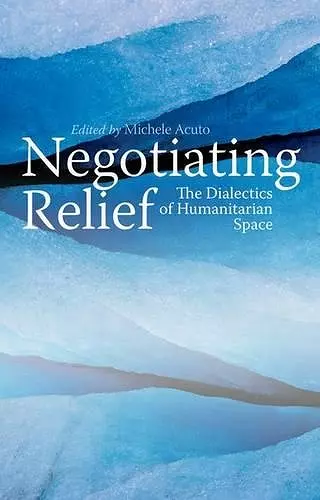Negotiating Relief
The Dialectics of Humanitarian Space
Format:Hardback
Publisher:C Hurst & Co Publishers Ltd
Published:20th Jun '14
Currently unavailable, and unfortunately no date known when it will be back

While humanitarianism is unquestionably a fast-growing subject of practitioner and scholarly engagement, much discussion about it is predicated on a dangerous dichotomy between 'aid givers' and 'relief takers' that largely misrepresents the negotiated nature of the humanitarian enterprise. To highlight the tension between these relationships, this book focuses on the 'humanitarian spaces' and the dynamics of 'humanitarian diplomacy' (both 'local' and 'global') that sustain them. It gathers key voices to provide a critical analysis of international theory, geopolitics and dilemmas underpinning the negotiation of relief. Offering up-to-date examples from cases such as Kosovo and the Tsunami, or ongoing crises like Haiti, Libya, Darfur and Somalia, the contributors analyse the complexity of humanitarian diplomacy and the multiplicity of geographies and actors involved in it. By investigating the transformations that both diplomacy and humanitarianism are undergoing, the authors prompt us towards a critical and eclectic understanding of the dialectics of humanitarian space. Negotiating Relief aims to present humanitarianism not only as a relief delivery mechanism but also as a phenomenon in dialogue with both localised crises and global politics.
'This is a very valuable collection. Michele Acuto has sketched out a new way of looking at humanitarian diplomacy, and brought together an impressive array of humanitarian scholars to examine what it means for humanitarian action to take an ever larger place in local and international politics. An excellent one-stop shop for humanitarian students and professionals alike.' - Hugo Slim, Senior Research Fellow at the university of Oxford Institute for Ethics, and author of Killing Civilians: Method, Madness and Morality in War 'One of the most notable features of modern society is the internationalisation of the human conscience and one of the great advances of the last hundred years has been the universalisation of the human rights norm. What does this signify for public policy in local and international politics? What is the humanitarian community, who are the humanitarian actors, is there such a thing as humanitarian space, and how sacrosanct should it be? A stellar cast of authors is assembled in this impressive volume to guide us towards answers to these critical questions of contested humanitarianism in an increasingly congested global space.' - Ramesh Thakur, Professor, Crawford School of Public Policy, Australian National University, and Editor-in-Chief, Global Governance 'One of the many virtues of this book is to move beyond a sterile debate between advocates of a "pure" humanitarianism and those who regard this as a myth about a golden age that has never existed. This high level collective volume includes overviews, thematic essays and case studies by experts with differing perspectives. It amply demonstrates the editor's conclusions that the important theoretical and practical tasks are now to engage effectively in a complex field in which the basic frames, institutions and norms of humanitarian spaces are called into question. The volume will be a key work for both specialists and those seeking an informed introduction to the major issues.' - Michael Newman, Emeritus Professor of Politics and Jean Monnet Professor of European Studies, London Metropolitan University, and author of Humanitarian Intervention: Confronting the Colonies
ISBN: 9781849042383
Dimensions: unknown
Weight: unknown